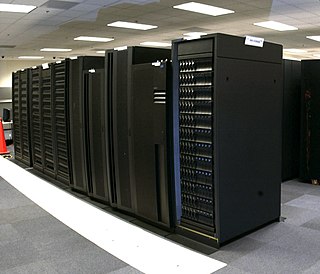
Data storage is the recording (storing) of information (data) in a storage medium. Handwriting, phonographic recording, magnetic tape, and optical discs are all examples of storage media. Biological molecules such as RNA and DNA are considered by some as data storage. Recording may be accomplished with virtually any form of energy. Electronic data storage requires electrical power to store and retrieve data.
Quantum Corporation is a data storage, management, and protection company that provides technology to store, manage, archive, and protect video and unstructured data throughout the data lifecycle. Their products are used by enterprises, media and entertainment companies, government agencies, big data companies, and life science organizations. Quantum is headquartered in San Jose, California and has offices around the world, supporting customers globally in addition to working with a network of distributors, VARs, DMRs, OEMs and other suppliers.

Iomega produced external, portable, and networked data storage products. Established in the 1980s in Roy, Utah, United States, Iomega sold more than 410 million digital storage drives and disks, including the Zip drive floppy disk system. Formerly a public company, it was acquired by EMC Corporation in 2008, and then by Lenovo, which rebranded the product line as LenovoEMC, until discontinuation in 2018.

In computing, a file system or filesystem is a method and data structure that the operating system uses to control how data is stored and retrieved. Without a file system, data placed in a storage medium would be one large body of data with no way to tell where one piece of data stopped and the next began, or where any piece of data was located when it was time to retrieve it. By separating the data into pieces and giving each piece a name, the data are easily isolated and identified. Taking its name from the way a paper-based data management system is named, each group of data is called a "file". The structure and logic rules used to manage the groups of data and their names is called a "file system."

American Megatrends International, LLC, doing business as AMI, is an international hardware and software company, specializing in PC hardware and firmware. The company was founded in 1985 by Pat Sarma and Subramonian Shankar. It is headquartered in Building 800 at 3095 Satellite Boulevard in unincorporated Gwinnett County, Georgia, United States, near the city of Duluth, and in the Atlanta metropolitan area.

Xsan is Apple Inc.'s storage area network (SAN) or clustered file system for macOS. Xsan enables multiple Mac desktop and Xserve systems to access shared block storage over a Fibre Channel network. With the Xsan file system installed, these computers can read and write to the same storage volume at the same time. Xsan is a complete SAN solution that includes the metadata controller software, the file system client software, and integrated setup, management and monitoring tools.
Hierarchical storage management (HSM), also known as Tiered storage, is a data storage and Data management technique that automatically moves data between high-cost and low-cost storage media. HSM systems exist because high-speed storage devices, such as solid state drive arrays, are more expensive than slower devices, such as hard disk drives, optical discs and magnetic tape drives. While it would be ideal to have all data available on high-speed devices all the time, this is prohibitively expensive for many organizations. Instead, HSM systems store the bulk of the enterprise's data on slower devices, and then copy data to faster disk drives when needed. The HSM system monitors the way data is used and makes best guesses as to which data can safely be moved to slower devices and which data should stay on the fast devices.

Storage Technology Corporation was a data storage technology company headquartered in Louisville, Colorado. New products include data retention systems, which it calls "information lifecycle management" (ILM).
A virtual tape library (VTL) is a data storage virtualization technology used typically for backup and recovery purposes. A VTL presents a storage component as tape libraries or tape drives for use with existing backup software.

The IBM Storage product portfolio includes disk, flash, tape, NAS storage products, storage software and services. IBM's approach is to focus on data management.
A clustered file system is a file system which is shared by being simultaneously mounted on multiple servers. There are several approaches to clustering, most of which do not employ a clustered file system. Clustered file systems can provide features like location-independent addressing and redundancy which improve reliability or reduce the complexity of the other parts of the cluster. Parallel file systems are a type of clustered file system that spread data across multiple storage nodes, usually for redundancy or performance.
Catalogic DPX is an enterprise-level data protection tool that backs up and restores data and applications for a variety of operating systems. It has data protection, disaster recovery and business continuity planning capabilities. Catalogic DPX protects physical servers or virtual machines on VMWare vSphere and Microsoft Hyper-V hypervisors, supports many database applications, including Oracle, SQL Server, SharePoint, Exchange, and SAP HANA. DPX supports agent-based or agent-less backups. Users can map to and use a backed up version of the database if something goes wrong with the primary version. DPX is managed from a single console and catalog. This allows for centralized control of both tape-based and disk-based data protection jobs across heterogeneous operating systems. DPX can protect data centers, remote sites and supports recovery from DR. DPX can protect data to disk, tape or cloud. It is used for various recovery use cases including file, application, BMR, VM or DR. DPX can spin up VMs from backup images, recover physical servers, bring up applications online from snapshot based backups, it can be used to recover from Ransomware.
StorNext File System (SNFS), colloquially referred to as StorNext is a shared disk file system made by Quantum Corporation. StorNext enables multiple Windows, Linux and Apple workstations to access shared block storage over a Fibre Channel network. With the StorNext file system installed, these computers can read and write to the same storage volume at the same time enabling what is known as a "file-locking SAN." StorNext is used in environments where large files must be shared, and accessed simultaneously by users without network delays, or where a file must be available for access by multiple readers starting at different times. Common use cases include multiple video editor environments in feature film, television and general video post production.
The IBM 3570 is a series of tape drives and corresponding magnetic tape data storage media formats developed by IBM. The storage technology and media were introduced using the name Magstar MP, combining the IBM storage brand name Magstar with MP for MultiPurpose. The IBM product number 3570 was associated with the tape drives and libraries that used the Magstar MP media.
FalconStor is a data management software company based in Austin, Texas.
The Linear Tape File System (LTFS) is a file system that allows files stored on magnetic tape to be accessed in a similar fashion to those on disk or removable flash drives. It requires both a specific format of data on the tape media and software to provide a file system interface to the data.

Luminex Software, Inc. is a developer and provider of mainframe connectivity, storage and data protection solutions, including virtual tape and data integration products.
Cofio Software, headquartered in San Diego, California, was a privately held software company founded in 2006 which produced a product called AIMstor. After being acquired in 2012 the product became known as the Hitachi Data Instance Director. and later became Hitachi Ops Center Protector
NetVault is a set of data protection software developed and supported by Quest Software. NetVault Backup is a backup and recovery software product. It can be used to protect data and software applications in physical and virtual environments from one central management interface. It supports many servers, application platforms, and protocols such as UNIX, Linux, Microsoft Windows, VMware, Microsoft Hyper-V, Oracle, Sybase, Microsoft SQL Server, NDMP, Oracle ACSLS, IBM DAS/ACI, Microsoft Exchange Server, DB2, and Teradata.
Dell EMC Data Domain was Dell EMC’s data deduplication storage system. Development began with the founding of Data Domain, and continued since that company’s acquisition by EMC Corporation.








